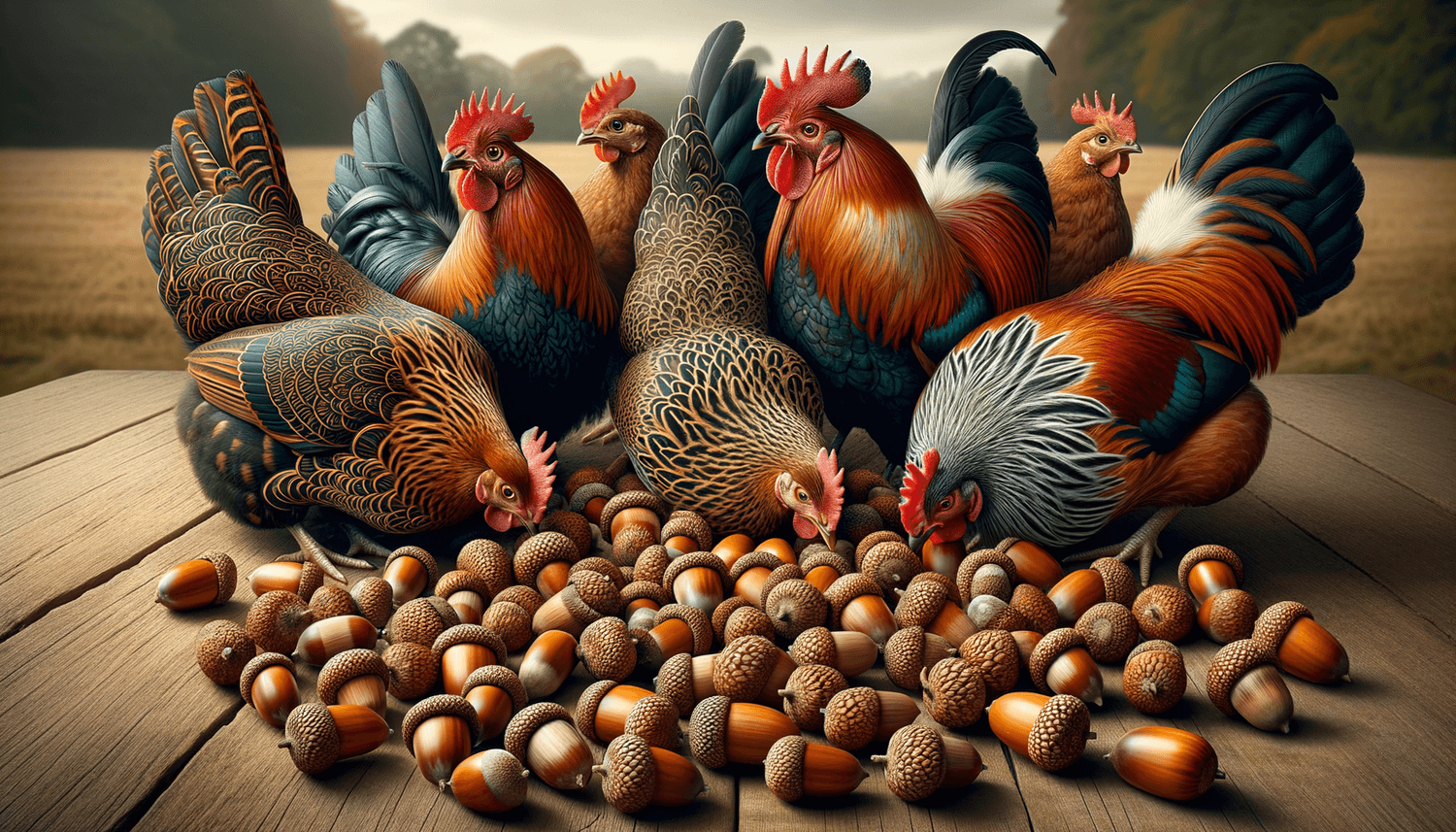Have you ever pondered the age-old question, “Can chickens eat acorns?” You’re not alone! As the leaves change colors and acorns tumble from the trees, many backyard chicken keepers find themselves scratching their heads in curiosity. Fret not, dear reader, for we are about to embark on a clucking adventure to decipher the mystery of whether acorns can fit into our beloved birds’ meals. We’ll explore the importance of a balanced diet, the benefits and potential risks of acorn consumption, the nutritional value of these woodland treasures, and even how to prepare a tantalizing acorn treat for your feathery friends—so fluff up your feathers, and let’s get cracking!
Can chickens eat acorns?
Yes, chickens can eat acorns, but with moderation. Acorns contain tannins, which can be toxic to chickens in large quantities. However, when consumed in limited amounts and mixed with other feed, acorns can provide a nutritious and safe supplemental treat for your backyard flock.
A balanced diet for your feathery friends
Just like humans, chickens need a balanced diet to live a healthy and happy life. It’s important to provide your backyard flock with the right nutrients to ensure their well-being and promote healthy egg production. A chicken’s diet should primarily consist of a high-quality chicken feed, which should make up around 80-90% of their diet. This chicken feed is specially formulated to provide essential vitamins, minerals, and protein that our feathered friends require.
As for the remaining 10-20% of a chicken’s diet, this is where tasty treats like fruits and vegetables come into play. Offering your chickens a variety of healthy and wholesome snacks will not only add excitement to their meals but also supply them with additional nutrients to support their overall health. Remember, though, that treats should be given in moderation to ensure that your chickens get the bulk of their nutrition from their main chicken feed.
Nutritional value of acorns for chickens.
Feeding acorns to chickens can offer some nutritional value when consumed in moderation. Acorns are rich in healthy fats, proteins, and carbohydrates, which can provide your chickens with a boost of energy. They also contain essential minerals such as potassium, magnesium, calcium, and iron, which are important for maintaining the overall health of your flock.
However, it’s important to keep in mind that the high tannin content in acorns can make them toxic to chickens when consumed in large quantities. These tannins may cause gastrointestinal issues and other health problems in your birds. To ensure the safety of your backyard flock, it’s crucial to control the amount of acorns your chickens eat and to incorporate them alongside other nutritious treats and high-quality chicken feed. By doing so, you’ll be making the most of the nutritional benefits acorns have to offer, while keeping the tannin-related risks at bay.
Nutrition table of acorns for chickens.
| Information | Description |
|---|---|
| Nutritional Value | Acorns are rich in fats, proteins, carbohydrates, and essential minerals such as potassium, magnesium, calcium, and iron. |
| Suggested Serving Size | Introduce acorns as a treat, ensuring they only make up a small portion of your chickens’ overall diet. |
| Safe Feeding Practices | Monitor the consumption of acorns to avoid excessive intake, mix them with other nutritious treats, and provide a balanced diet. |
| Preparation | Crushed or chopped acorns make it easier for chickens to consume, and soaking acorns in water can help reduce tannin content. |
| Potential Risks | Consumption of large quantities of acorns can lead to gastrointestinal issues and other health problems due to their tannin content. |
| Hydration | While acorns don’t provide hydration, ensure fresh water is always available for chickens to drink while consuming any treats. |
| Digestion | Acorns are generally easy to digest for chickens, but excessive intake of tannins can cause digestive issues. |
| Seasonal Availability | Acorns are most commonly available in the fall and can be gathered and stored for use throughout the year. |
| Other Benefits | Feeding acorns can help reduce food waste, support local wildlife populations, and provide an economical treat for your flock. |
Soaking and leaching acorns to reduce tannins
If you’re concerned about the tannin content in acorns, we have a solution! Soaking and leaching acorns in water can significantly help reduce the tannins. Simply crush or chop the acorns and immerse them in water. You can soak them in cold water for a few days, changing the water every 12 hours, or opt for boiling the acorns for 1-2 hours, regularly replacing the water. This process makes acorns a safer and more enjoyable treat for your chickens.
Foraging and environmental sustainability
Adding acorns to your chickens’ diet is not only a nutritious treat option but also supports environmental sustainability. Foraging for acorns is a great way to connect with nature and make use of resources in your own backyard. Collecting acorns not only reduces food waste but also benefits your pocketbook, as they are a free, local, and readily available resource. Just remember to leave some for the squirrels and other wildlife that rely on acorns as a food source!
In conclusion, while acorns shouldn’t make up a large portion of a chicken’s diet, they can still provide nutritional benefits when given as an occasional treat. Make sure to monitor your chickens’ acorn consumption and prepare the acorns properly by soaking and leaching to minimize the tannin content. Besides, incorporating acorns as a treat helps promote environmental sustainability and can even save you some money. Enjoy the fun and benefits of incorporating this seasonal backyard treat into your flock’s menu!

















